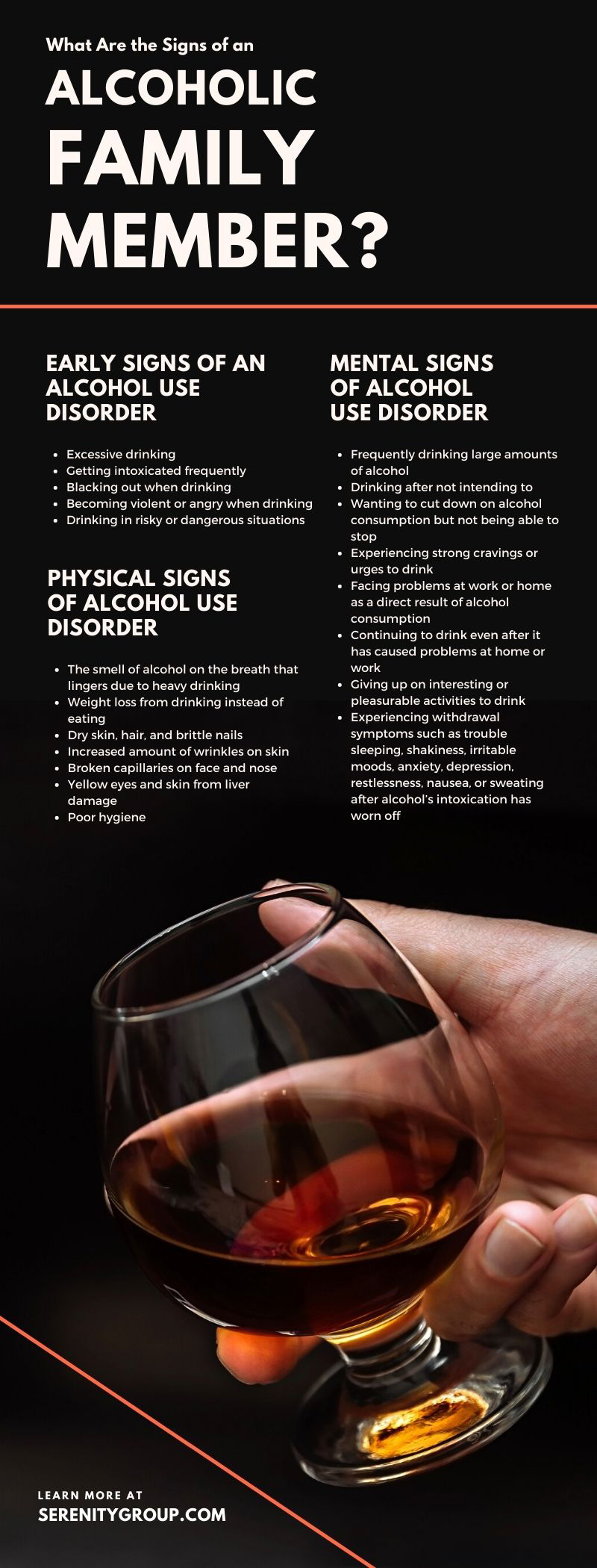What Are the Signs of an Alcoholic Family Member?

Alcoholism is a disease that affects millions of Americans each year. In many cases, those who suffer through alcoholism do so in complete silence and without support from those around them. When this is the case, it can be hard for an alcoholic to feel rewarded for their efforts, and they may turn back to alcoholism in the long run. Often, it will take some sort of outside engagement to spur an alcoholic into action to make up for their alcoholism. This article will cover:
- What is alcohol use disorder?
- Early signs of an alcohol problem
- Physical signs of alcohol use disorder
- Mental signs of alcohol use disorder
- Financial consequences of alcohol use disorder
Here are the major signs of an alcoholic family member.
What Is Alcohol Use Disorder?
For many, alcohol has a strong effect when consumed in low to moderate amounts but isn’t inherently unhealthy or dangerous. However, if excessive drinking behaviors are continually exhibited, these behaviors can lead to an addiction commonly known as alcoholism. In its most general sense, alcohol use disorder is characterized by cravings of both physical and mental variety for alcohol, emotional dependence on alcohol, and negative emotions when drinking. At its basis, alcoholism is a chronic and easily relapse-prone brain disorder that will have many long-term negative health consequences in such areas as the heart and lungs. ln addition, alcohol use disorder will commonly result in negative life consequences, such as being fired, troubled familial relationships, and a troubled legal history.
Early Signs of an Alcohol Use Disorder
When it comes to recognizing the major signs of an alcoholic family member, it helps to know the early signs of alcohol use disorder. That way, if this situation ever does occur in the future, you will be prepared to know what to look for in your family members to determine if they have any of the early symptoms of alcohol use disorder. Some of the most common early signs of an alcohol use disorder include:
- Excessive drinking
- Getting intoxicated frequently
- Blacking out when drinking
- Becoming violent or angry when drinking
- Drinking in risky or dangerous situations
It is important to remember that someone exhibiting symptoms of alcoholism is often not going to fit the picture of someone you may suspect to be an alcoholic. It is often only shown in minor behavioral patterns that only a parent who really knows their child may notice. As such, it may fall on you to understand the signs of more heavy alcohol dependence, as this is the period where you are more likely to see more pronounced symptoms of a person’s alcohol dependence.
Physical Signs of Alcohol Use Disorder
Excessive drinking and alcohol can have a range of physical side effects. Remember that everyone processes alcohol slightly differently, meaning that some or all symptoms may not show up in every case of alcoholism. Some of the most common physical signs of an alcohol abuse problem include:
- The smell of alcohol on the breath that lingers due to heavy drinking
- Weight loss from drinking instead of eating
- Dry skin, hair, and brittle nails
- Increased amount of wrinkles on skin
- Broken capillaries on face and nose
- Yellow eyes and skin from liver damage
- Poor hygiene
As mentioned before, the signs of alcohol abuse can vary based on person to person. However, the physical signs caused by drinking are far superseded by the mental anguish it can cause its victims and their families.
Mental Signs of Alcohol Use Disorder
Alcohol use disorders’ effects on the mental wellbeing of the victim will often far outpace the physical damage that alcohol will do to someone over their lifetime. As with the physical signs exhibited, many of the mental signs may take some time to exhibit. As was said before, everyone processes alcohol differently, with some being able to be functional during the day and others not. With that in mind, some of the most common mental signs of alcohol use disorder include:
- Frequently drinking large amounts of alcohol
- Drinking after not intending to
- Wanting to cut down on alcohol consumption but not being able to stop
- Experiencing strong cravings or urges to drink
- Facing problems at work or home as a direct result of alcohol consumption
- Continuing to drink even after it has caused problems at home or work
- Giving up on interesting or pleasurable activities to drink
- Experiencing withdrawal symptoms such as trouble sleeping, shakiness, irritable moods, anxiety, depression, restlessness, nausea, or sweating after alcohol’s intoxication has worn off
Financial Consequences of Alcohol Use Disorder
Alcohol can not only have a devastating effect on your personal and professional life, but it can also have a major cost on a person’s financial wellbeing. Many extreme consequences result from being intoxicated, the most notable of which is a drunk driving charge. Drunk driving can result in a license suspension as well as major fines relating to the infractions incurred while under the influence. Drunk driving will force the driver to take out extra insurance policies specifically against drunk driving, and their insurance premiums will be higher for years after the incident. If all these consequences sound like something you want your family member to avoid, you definitely need to learn the signs of an alcoholic.
We hope that this article has been helpful in helping you determine what the signs of an alcoholic family member are. If you have had a family member who recently incurred a drunk driving charge, you are definitely going to need to help them get high-risk insurance to enable them to regain their license.
If you are looking for some cheap sr22 insurance rates online, consider reaching out to Serenity Group. We have an amazing selection of rates according to your driving history and vehicle type! As well, if you are looking for a rehab center for an alcoholic family member, consider reaching out to your local AA chapter to get resources on where you can find meetings and detox resources!


Recent Comments